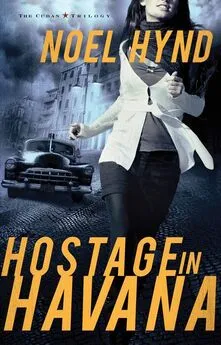Noel Hynd - Hostage in Havana
- Название:Hostage in Havana
- Автор:
- Жанр:
- Издательство:неизвестно
- Год:неизвестен
- ISBN:нет данных
- Рейтинг:
- Избранное:Добавить в избранное
-
Отзывы:
-
Ваша оценка:
Noel Hynd - Hostage in Havana краткое содержание
Hostage in Havana - читать онлайн бесплатно полную версию (весь текст целиком)
Интервал:
Закладка:
Guarneri turned sharply and looked also. “Uh-oh,” he said, followed by a violent obscenity. “Local militia!”
The squad of men on the beach spread out and went into crouching positions. In the center of the squad stood a small wiry man in a similar blue uniform but with a red beret. He was obviously the commander. He had no rifle, but he wore a sidearm and carried a megaphone. He let the boat ease closer; then he raised the megaphone and started to bark orders in angry Spanish.
“Paul, what is it?” Alex pressed.
“I don’t know. I’ll handle it!” he said. “Everyone stay calm.”
Guarneri moved to the bow of the boat, arms aloft, waving as if in friendship. Leo, at the tiller, looked petrified, as did Pedro. Felix’s face seethed with rage.
Alex was about to put a hand to Felix to calm him. Instead, impetuously, Felix broke toward the front of the boat, slid into a low crouching position, and pointed his weapon toward the shore.
Meanwhile, the small man in the red beret continued to bark at them through his bullhorn. He announced that he was Major Ivar Mejias of some police brigade, but that was all Alex could hear.
Paul saw clearly what Felix was about to do, but he couldn’t stop it. Neither could Alex.
“?Felix! ?Calmese!” Paul yelled. Stay calm! But it was too late. Felix opened fire on the men on the beach, firing half a dozen shots. “Felix! No! No! No!” Paul screamed.
The commander dropped his bullhorn midsentence and ran for cover. The other men scattered, and Alex saw at least one of them go down, clutching a shoulder, hit by one of Felix’s bullets.
Paul tackled Felix and knocked his gun away. But this was followed instantly by a barrage of gunfire thrown back at Leo’s boat. Then Pedro, almost as impetuous as Felix, raised his pistol and fired wildly at the shore. Meanwhile, Paul and Felix hit the deck, wrestling.
The first barrage of return fire hit the boat with a series of powerful, heavy whacks. Pedro was the first to go down. He was hit badly, and more than once. He made a horrible guttural sound, and his pistol flew from his hands. Then he got hit again. He staggered as another volley found him, and suddenly he was picked up and hurled overboard, as if by an invisible hand. At the same time, Felix broke free of Paul’s grip, grabbed his rifle, and tried to stand, but a bullet found him as well. He hurtled backward, the rifle flying from his hands. It rattled onto the rail and tumbled overboard.
Alex had hit the deck as soon as she could. The boat veered wildly in the water, its tiller not guided by any hand and the boom now swinging freely. As the floodlights illuminated their boat, Alex knew that somewhere along the line – either in the intelligence community, in the underworld, or in some cabal she did not yet know or understand – something had gone horribly wrong.
“Paul!” she screamed. “Paul!”
She could see Guarneri, lying flat on the deck but moving, apparently untouched by the gunfire. The same could not be said for Felix. He was lying across the foredeck, blood pouring from the wounds in his neck and upper chest. Alex had no idea if the man was dead. Not far away, Leo was also on the deck, bleeding badly.
Paul wriggled forward toward Pedro’s pistol. Shots continued to hit the small skiff. They hit the hull of the boat, ripped through the sail, and ripped into the wood of the mast. Guarneri put the nose of Pedro’s pistol over the bow and began to spray bullets toward the beach. Alex watched for a second, which seemed to last a lifetime. The men had all successfully scattered except for one who was trying to crawl to shelter. No one was helping him. Then Guarneri turned toward her, while keeping his head low.
“It’s me they want! They’re going to kill me! You! Get out of here!”
She made a helpless gesture. Get out? How? She was frozen in place. But to delay obviously meant death.
“Get out!” Guarneri demanded. “Jump and swim!”
“No!” she said. She reached toward her own weapon. Her instinct told her to stay and fight. But her hands were soaking, and she couldn’t quickly access her pistol.
“Alex!” Guarneri demanded again. She looked up. Bullets continued to hit the boat. “Get out or I’ll shoot you myself!” he screamed. And to break her out of her trance, he turned his revolver to her and fired a shot near her. It ripped away a chunk of wood on the hull. It was all the impetus she needed.
She crawled madly a few feet toward the stern and with a quick motion pulled herself over the side. She hit the water with a dull splash, sinking instantly. She never touched the bottom but knew immediately that she was well over her head. A moment later she reached the surface again. The water was warmer than she expected, which was good. That meant hypothermia wouldn’t be a problem. Still, if she got hit with a bullet, hypothermia would be the least of her problems.
She stayed behind the boat, with her head above water only at nose level. Even through the mist, the scene was surreal. The boat was still only about fifty yards offshore, but she could hear the angry shouts and curses from the reception party. She moved several feet behind the boat. Stray bullets hit the waters around her with sharp zipping little splashes. Paul threw the occasional pistol shot toward shore to slow the pursuers. He was the only one returning fire, and he was trying to work the tiller, throw the sail back up, and turn the boat at the same time.
She assessed where the floodlights were and whether they would follow her. There seemed to be three of them, two high ones on the top of the building and a smaller one that seemed to be mounted on a truck. At the same time, she counted the men on the beach. There were eight, maybe ten, not counting the little runt in the red beret.
She treaded water for a moment, then knew it was best to get away from the boat as quickly as possible. Yet part of her heart and conscience was in the boat. Guarneri kept firing at the shore party, and they were returning his fire.
Despite her terror and her tears, her instinct for self-preservation took over. She moved a dozen yards from the boat. Then two dozen.
She could feel a strong current, and wisely, she allowed herself to go with it. To fight it would be to spend all her energy and end up where she began. To ride it would allow her to get farther away than swimming alone could take her.
The gunfire continued but was more sporadic. She kept her head low, exposed just enough to breath. She was sure someone, somewhere, was scanning the area with binoculars, maybe even a sharpshooter looking for anyone who had escaped. She kept her arms under water and moved rhythmically with the current, gaining greater distance. The floodlights still blinded her, and she could still hear the crackle of gunfire, and now and then the sound of the bullhorn, as the opposing force presumably closed in on Paul.
Oh, Paul. Oh, Paul. Oh, Paul, she felt herself thinking. But she kept drifting. Then she was confident enough to use her arms to start a slow crawling swim. She guessed she was a hundred feet from the boat. She kept going. When she was maybe another fifty yards away, the shooting stopped. She kept moving, pulling herself along on her back now and allowing herself the dark luxury of watching events unfold. The sailboat’s mast had crumbled from the gunfire, and lay nearly motionless in the water, like a great wounded gull. The boat was bathed in floodlight, and now a pair of small craft, filled with pale figures in dark blue uniforms, cautiously approached it.
Then there was another volley of bullets from Leo’s boat. The engine started again, and the crippled craft wobbled back out toward the sea. A few moments later the two police boats started in pursuit.
There was no more return fire from the boat.
Alex reasoned that Paul had been wounded or killed. In any case, the battle seemed to be over. Then the heavy floodlight from the top of the old house started to sweep the water around the boat, and Alex knew it was looking to see if anyone had escaped. If they’d been specifically betrayed, she knew, then the police would soon be looking for her.
Once, when the floodlight swept in her direction, she ducked under the surface for several seconds, waiting for it to pass. She was already breathless and could only hold her breath for about twenty seconds before coming up for air. But by then the light was gone.
She looked back. In the middle of the cove, the defenders of the Cuban shore were boarding the battered sailboat. No sign of Paul. Could he too have gotten overboard and evaded them?
She doubted it.
Then they sprayed the water with automatic weapon fire, including a few shots which landed not far from her. But obviously they’d lost sight of her in the low mist, if they’d ever seen her at all. So she kept going. Her emergency pack. The gun, the money, the passport, was still strapped to her body. She could feel everything.
Then she realized. The sky was brightening. Daylight would be her enemy.
Alex pulled herself through the water.
A jetty blocked her view of the landing area, but she noticed another cove about a hundred yards beyond it. Slowly she moved through the water. Getting to land now was her only priority.
By this time the sky was lighter, but the shore remained dark. She continued to pull herself toward the cove, but could not make out the topography. She didn’t know if it was an area of sand, rocks, or even jagged coral, which could slice her shoes and feet. She pulled herself along for several more minutes until, finally, her feet touched the bottom.
It felt like soft dirt, mixed with sand and the occasional rock. That was good. She proceeded slowly. She knew a foot or ankle injury now would be disastrous. Next thing she knew, she was wading. First shoulder deep, then waist deep, then ankle. Then, alone and nearly at the point of collapse, she was on a strip of sand that formed a small pleasant beach. She staggered to a small stand of palm trees that would give her cover. Then she collapsed.
Bienvenidos a Cuba. Welcome to Cuba.
FORTY-ONE
The sun was one hour higher in the morning sky when Major Ivar Mejias of the Policia Nacional Revolucionaria stood on the beach, his arms folded angrily in front of him. He spat on the ground. He was filled with frustration and rage. On the surface, this should have been a routine operation, picking off some contrabandistas as they hit the Cuban sand, grabbing them as they came off the boats or dropped their cargo. He had done this dozens of times in the past, whenever he had received a tip.
But today the bullets had flown for no reason and everything had turned ugly. Now he would have some higher-ups taking a close look at the way this had been handled, poking their long noses into his butt, to use the expression that was common in his bureau, and that was exactly what he didn’t want. Worse, the affair might now get turned over to the Ministry of the Interior, whose security division dealt with espionage and sabotage. A little of that – and this whole affair would be beyond his control.
He cursed again.
Two of Major Mejias’s men needed first aid and were waiting for ambulances. Both had flesh wounds. Thank God, Mejias muttered to himself, none had been killed or seriously injured. His “men” were little more than boys, if the truth were told. They were conscripts. All young Cuban men owed service to the state and were assigned to either the army or the police. Lately, he was getting a real snootful of these country chicos working out of his headquarters in Havana.
Читать дальшеИнтервал:
Закладка:










